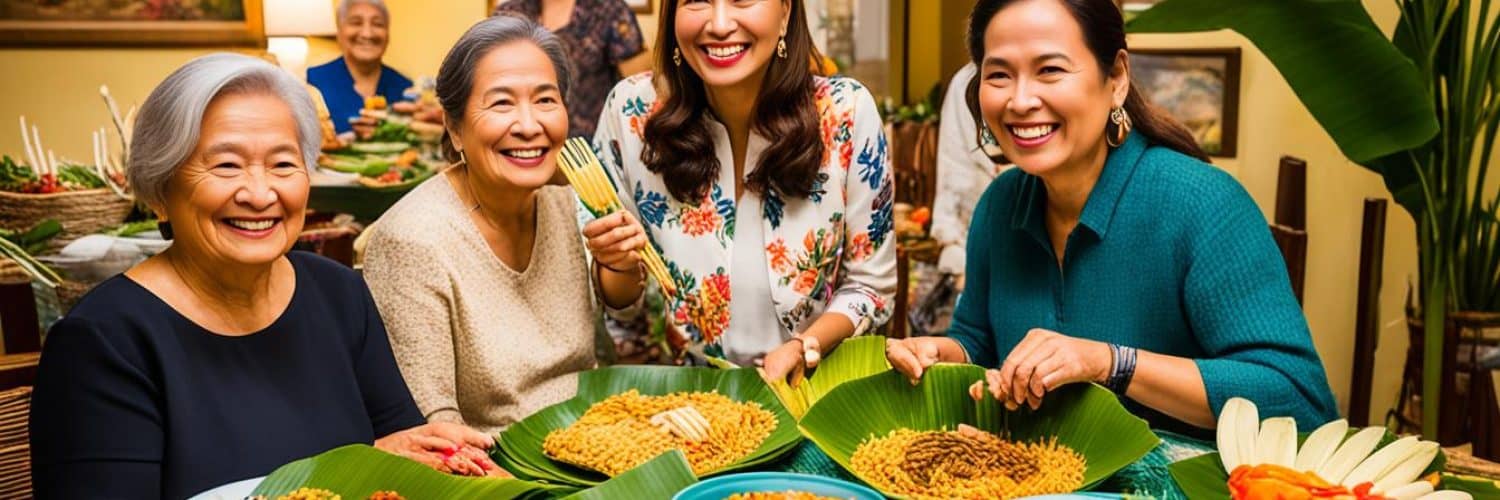Are you considering dating or marrying a Filipina woman? Are you intrigued by the idea of experiencing traditional Filipino marriage customs and understanding the unique qualities of a Filipina wife? You’re not alone. Filipina women are known for being strong, loving, and deeply rooted in their cultural traditions. But what exactly does it mean to live with a Filipina wife? What are the roles and expectations within Filipino marriage customs? Let’s delve into the fascinating world of Filipina wife culture and traditions to gain insight and appreciation for this richly diverse and captivating culture.
Key Takeaways:
- Filipino culture places a strong emphasis on family, loyalty, and respect.
- Understanding the importance of family in Filipina wife culture is crucial for building a harmonious relationship.
- Loyalty and respect are highly valued in Filipina wife culture, and communication styles may differ from what you’re accustomed to.
- Cultural differences in problem-solving and decision-making can influence your relationship dynamics.
- Many Filipinos are Catholic, and their religious beliefs greatly influence their views on marriage, family, and sexuality.
Now let’s explore these aspects in more detail and gain a deeper understanding of Filipina wife culture and traditions.
The Importance of Family in Filipina Wife Culture
Filipino culture places a strong emphasis on family and community. Family is considered the cornerstone of Filipino society, and the bonds between family members are deeply cherished. For your Filipina wife, her family is an integral part of her life, and she values their presence, love, and support.
In Filipino culture, it is common for extended families to live close to each other, often in the same neighborhood or even the same household. This close proximity allows for frequent gatherings and interactions, fostering strong relationships among family members.
Your Filipina partner may have a large extended family, including grandparents, aunts, uncles, cousins, and more. These family members play a significant role in each other’s lives and are actively involved in important life events and celebrations.
When you marry a Filipina, you become a part of her extended family as well. You will be welcomed with open arms and treated as a beloved member of the family. It is common for multiple generations to live together under one roof, creating a close-knit and supportive environment.
Having multiple generations living together allows for the transfer of knowledge, traditions, and values from one generation to the next. The older members of the family serve as mentors and role models, passing down wisdom and advice to the younger ones. This intergenerational dynamic creates a strong sense of unity and continuity within the family.
The image above beautifully captures the essence of a Filipino family, showcasing the warmth, love, and togetherness that is central to Filipino culture. It depicts multiple generations living together and highlights the strong bonds that exist between family members.
In addition to the importance placed on immediate family, Filipinos also have a strong sense of kinship with their extended family. This includes relatives beyond blood relations, such as godparents, close friends, and neighbors. These relationships are often treated as extensions of the family and are cultivated with care and respect.
Through the strong emphasis on family, Filipina wife culture nurtures a sense of belonging, support, and love. It provides a firm foundation for building lasting relationships and lays the groundwork for a fulfilling and harmonious family life.
Building Close Relationships
One of the most remarkable aspects of Filipino culture is the value placed on building close relationships. Filipinos are known for their warmth, friendliness, and genuine hospitality. They deeply value connection and strive to foster meaningful relationships with others.
In Filipino marriage and family life, this emphasis on close relationships extends beyond immediate family members. It encompasses the entire network of relatives, friends, and even members of the community. Filipinos believe in forming strong bonds with others and in actively investing time and effort into nourishing these relationships.
“Family isn’t always blood. It’s the people in your life who want you in theirs; the ones who accept you for who you are. The ones who would do anything to see you smile and who love you no matter what.”
– Unknown
This quote beautifully captures the essence of Filipino culture and the importance placed on relationships. Family is not limited to blood ties but includes those who love and support you unconditionally.
As you embrace your Filipina wife’s culture, it is essential to recognize the significance of close relationships and actively participate in nurturing these connections. Show genuine interest in getting to know her family, spend time with them, and engage in activities that strengthen the bonds between you and your extended family.
By embracing the importance of family and building close relationships, you can create a loving and supportive environment for yourself, your Filipina wife, and future generations to come.
Loyalty and Respect in Filipina Wife Culture
Filipinos strongly emphasize loyalty and respect in relationships. When you marry a Filipina, these values become essential to the foundation of your partnership. Loyalty entails being faithful and committed to your wife and the relationship itself. Your Filipina wife expects your unwavering devotion and dedication.
In addition to loyalty, respect is highly valued in Filipina wife culture. It encompasses respect for your wife, her family, and their traditions. Showcasing respect is integral to fostering a healthy and harmonious relationship. This includes embracing and understanding cultural differences in communication, which may vary from your own.
Communication styles in the Filipino culture can differ from what you may be familiar with. Filipinos often rely on nonverbal cues, such as tone of voice and facial expressions, to convey meaning. They may be more indirect in their approach, preferring to navigate sensitive topics with subtlety. It’s important to listen attentively and interpret these nonverbal cues to understand their perspective fully.
Moreover, Filipinos tend to avoid confrontation and may be hesitant to express disagreement or criticism openly. Be mindful of this and create a safe and open environment for communication. Encourage your Filipina wife to express her thoughts and feelings honestly, ensuring that she feels heard and respected.
“Respect is not just given; it is earned through mutual understanding and acceptance of each other’s cultural differences.”
Remember, building a committed and respectful relationship requires patience, understanding, and willingness to learn and adapt to each other’s cultural backgrounds. By embracing loyalty and respect, you strengthen the bond with your Filipina wife while creating a solid foundation for a lifetime of love and harmony.

| Filipino Communication Styles | Western Communication Styles |
|---|---|
| Use of nonverbal cues | Direct verbal communication |
| Indirect approach | Direct and straightforward approach |
| Tone of voice and facial expressions carry meaning | Reliance on words to convey meaning |
| Avoidance of confrontation | Openness to addressing conflicts directly |
| Reluctance to express disagreement or criticism | Willingness to express differing opinions |
Cultural Differences in Problem-solving and Decision-making
| Problem-solving | Decision-making | Cultural Differences |
|---|---|---|
| Collectivism | Group’s welfare | Cultural differences influence how Filipinos approach problem-solving and decision-making processes. The prevailing cultural value of collectivism prioritizes the group’s welfare over individual needs. In Filipino culture, the emphasis is on considering the opinions and perspectives of the community or family before making decisions. This approach ensures a collaborative and consensus-driven decision-making process that promotes unity and harmony. |
| Individualism | Individual needs |
In Filipino culture, problem-solving and decision-making are deeply rooted in the concept of collectivism. This means that the well-being and interests of the group take precedence over individual desires. The emphasis is on fostering harmony and unity within the community or family rather than prioritizing individual needs.
This cultural value has a significant impact on how Filipinos approach these processes. When faced with a problem, Filipinos are more likely to seek input from others and consider the opinions and perspectives of those involved before arriving at a solution. This collaborative approach ensures that everyone’s needs and concerns are taken into account, leading to a decision that is beneficial to the entire group.
The value of collectivism also extends to the decision-making process. In Filipino culture, decisions are often made collectively, with the goal of achieving consensus. This involves open discussions, weighing different options, and considering the potential impact on all parties involved. The decision-making process may take longer as the input and perspectives of each individual are valued. However, this inclusive approach fosters a sense of unity and ensures that decisions align with the values and goals of the community or family.
This image portrays the collaborative and consensus-driven nature of problem-solving and decision-making in Filipino culture.
Influence of Catholicism in Filipina Wife Culture
One of the significant factors shaping the mindset and values of Filipina wives is the influence of Catholicism. Catholic faith plays a vital role in the lives of many Filipinos, impacting their perspectives on various aspects of life, including marriage, family, and moral values.
Catholics in the Philippines adhere to the teachings and doctrines of the Catholic Church, which emphasize the sacramentality of marriage and the importance of building a strong and harmonious family. The Catholic Church views marriage as a sacred bond, a lifelong commitment between a man and a woman.
Under the guidance of Catholicism, Filipina wives often prioritize the values of loyalty, fidelity, and dedication in their marital relationships. Their religious beliefs teach them the significance of nurturing a loving and committed partnership, built on mutual respect and shared spiritual values.
In Catholic Filipino households, the traditional roles of husbands and wives are often influenced by the religious teachings. Traditional gender roles maintain a focus on the husband as the provider and the wife as the caretaker of the family. These roles can vary depending on individual beliefs and personal choices, but they generally reflect the influence of Catholic faith in guiding Filipina wives’ perceptions of their responsibilities within the context of marriage and family.
It is worth mentioning that the Catholic Church’s teachings also influence Filipina wives’ views on other topics such as family planning, contraception, and sexuality. The Church promotes the value of openness to life and encourages natural methods of family planning. Consequently, many Catholic Filipina wives prioritize responsible parenthood and may choose to have larger families.

The Catholic faith also places a strong emphasis on upholding moral standards and practicing sexual abstinence before marriage. This can influence Filipina wives’ views on premarital sex, fostering a conservative approach that values virginity and encourages the sanctity of the marital relationship.
Despite the influence of Catholicism, it is important to note that individuals’ beliefs and practices can vary within the Filipino community. Some Filipina wives may have more liberal views that integrate their personal experiences and evolving societal perspectives.
Sexual Relationships in Filipina Wife Culture
In Filipino culture, traditional values and religious beliefs often play a significant role in shaping views on sexual relationships. The concept of virginity is highly valued, and premarital sex is generally frowned upon. However, it’s crucial to acknowledge that attitudes toward sex and sexuality can vary widely among individuals and communities within the Philippines.
While some individuals may adhere strictly to traditional views on premarital sex, others may have more progressive attitudes. Communication plays a vital role in understanding and navigating personal boundaries and expectations within a relationship. Honest conversations about intimacy, desires, and expectations are essential for building a healthy and fulfilling sexual relationship with your Filipina wife.
It’s also important to consider the availability of contraception and family planning resources. Access to contraception can contribute to a more responsible and informed approach to sexual relationships within a marriage. Being aware of the various options available and discussing them openly with your partner can help establish mutual understanding and ensure the well-being of both individuals.
“A successful sexual relationship is built on trust, respect, and open communication. Discussing your expectations, desires, and concerns with your Filipina wife can help foster a strong and intimate connection.”
Furthermore, within the context of marriage, it is common for couples in Filipino culture to be monogamous. Sexual relationships are typically reserved for the commitment and sanctity of marriage. This emphasis on marital fidelity stems from the values of loyalty, trust, and the desire to build a strong foundation for a lifelong partnership.
Contraception Availability in the Philippines
While the Philippines is predominantly influenced by Catholicism, it’s important to note that the country has various family planning initiatives and efforts in place. Both natural and modern contraceptive methods are accessible for individuals seeking to plan their families responsibly. Various organizations and healthcare providers offer information and services related to contraception and reproductive health.
| Type of Contraceptive | Availability |
|---|---|
| Condoms | Readily available in drugstores and supermarkets |
| Oral Contraceptives | Prescribed by healthcare professionals and available in pharmacies |
| Intrauterine Devices (IUDs) | Available in clinics and hospitals with proper medical guidance |
| Injectable Contraceptives | Administered by healthcare professionals |
It is essential for couples to have open and honest discussions about family planning and contraception to ensure mutual understanding and informed decision-making.
The image above represents the intimate bond and connection that can be fostered through open communication and respect in a sexual relationship with your Filipina wife.
Raising Children in Filipina Wife Culture
Child rearing is an integral aspect of Filipino culture, reflecting the strong emphasis placed on family and the values it upholds. In the Philippines, parents are deeply involved in the upbringing of their children, with extended family members playing a significant role in shaping their development.
Filipino parents have high expectations for their children’s education and growth, recognizing its importance in fostering a successful future. They instill a strong emphasis on discipline and respect for authority, guiding their children to become disciplined, responsible individuals.
This emphasis on discipline stems from the belief that structure and guidance are key to raising well-mannered and educated children. Filipino parents firmly believe that providing guidance and setting boundaries create a solid foundation for their children’s character development and future success.
Parenting in Filipino culture is not solely the responsibility of the parents themselves â it is a collective effort involving both immediate and extended family members. The involvement of extended family members, such as grandparents, aunts, and uncles, brings a sense of unity and support to the upbringing of children.
Through the involvement of the extended family, children receive guidance and love from multiple sources, fostering a strong sense of belonging and connection to their cultural roots.
Education: A Cornerstone of Filipino Child Rearing
In Filipino culture, education holds immense value, viewed as a means to break the cycle of poverty and create a brighter future. Filipino parents strive to provide their children with the best educational opportunities available, often sacrificing their own comforts to ensure their children’s academic success.
Emphasis is placed not only on academic achievement but also on cultivating values such as diligence, perseverance, and respect for knowledge. Filipino parents believe that education opens doors to various opportunities, equipping their children with the skills necessary to thrive in a highly competitive global society.
Discipline: Nurturing Respect and Responsibility
Discipline is deeply ingrained in Filipino child rearing practices, aiming to teach children the values of respect, obedience, and responsibility. Parents set clear boundaries and expectations, providing consistent discipline to help their children understand the importance of morals and ethics.
Filipino parents employ various disciplinary methods, including positive reinforcement, constructive criticism, and teaching moments. The use of distinct disciplinary strategies seeks to guide children towards making responsible choices, emphasizing the development of good character and personal integrity.
Promoting Cultural Identity
Filipino child rearing also focuses on instilling a deep sense of cultural identity and pride in children. Parents impart traditional values, customs, and beliefs, ensuring that their children have a strong connection to their Filipino heritage.
Through stories, traditions, and participation in cultural events, children learn about the rich history, traditions, and diverse customs that define Filipino culture. This nurturing of cultural identity strengthens the bond between children and their heritage, allowing them to navigate the world with a strong sense of self and belonging.

With a strong emphasis on discipline, education, and the involvement of extended family members, Filipino child rearing reflects the values and aspirations of Filipino culture. Through this holistic approach to parenting, Filipino parents strive to raise children who are respectful, responsible, and equipped for a successful future.
Appreciating Filipino Cuisine in Filipina Wife Culture
Filipino cuisine is a harmonious blend of flavors and influences from various cultures, including Malay, Spanish, Chinese, and American. It is a true reflection of the rich and diverse Filipino culture. From savory dishes to mouthwatering desserts, Filipino cuisine offers a delightful gastronomic experience that captivates both locals and foreigners alike.
When exploring Filipino cuisine, you’ll discover a wide range of popular dishes that showcase the unique flavors and ingredients of the Philippines. Some of these beloved dishes include:
- Adobo: A classic Filipino dish made with meat (typically pork or chicken) marinated and cooked in a flavorful combination of soy sauce, vinegar, garlic, and spices. It is often served with steamed rice and is a staple in Filipino households.
- Sinigang: A tangy and savory soup made with tamarind as the base flavor, combined with various vegetables, meat, or seafood. Sinigang offers a refreshing and comforting taste that is perfect for any occasion.
- Lechon: A festive dish that takes center stage during special occasions and celebrations. Lechon refers to a whole roasted pig cooked over an open fire, resulting in crispy skin and tender, flavorful meat.
- Pancit: A variety of noodle dishes that come in different flavors and styles. Pancit represents long life and prosperity in Filipino culture, making it a popular choice for birthdays and other significant events.
In addition to these iconic dishes, Filipino cuisine also boasts an abundance of seafood and fish dishes, as the Philippines is an archipelago surrounded by bountiful waters. Some popular seafood dishes include grilled squid (inihaw na pusit), fish escabeche (sweet and sour fish), and shrimp sinigang.
Filipino cuisine also embraces a wide variety of fruits and vegetables, showcasing the country’s agricultural abundance. From the tropical sweetness of mangoes and bananas to the earthy flavors of eggplant and bitter melon, every dish is infused with vibrant tastes and textures.
Respecting your partner’s dietary preferences and customs is essential in Filipina wife culture. Be open to trying new foods and flavors, as it is an excellent way to show your appreciation for their heritage. Food is a language of love in the Filipino culture, and by embracing Filipino cuisine, you are embracing a part of their identity.
Whether you’re enjoying a humble home-cooked meal or indulging in sumptuous feasts with your Filipina wife and her family, Filipino cuisine will surely tantalize your taste buds and create unforgettable culinary experiences.
Evolving Gender Roles in Filipina Wife Culture
In traditional Filipino culture, gender roles have been defined by societal norms and expectations. Men are typically regarded as the primary breadwinners, responsible for providing for their families financially. On the other hand, women are traditionally expected to fulfill the role of homemakers and caregivers, taking care of the household and raising the children.
However, it is essential to recognize that these gender roles are evolving and changing, especially in urban areas and among younger generations. As the world progresses and society becomes more inclusive and equal, traditional gender roles are being challenged.
Communication with your partner:
It is crucial to have open and honest communication with your Filipina wife about gender roles and expectations in your relationship. Discuss how each of you envisions dividing responsibilities and working together to create a balance that suits both of your needs and desires.
Respect for individual choices:
Recognize that every individual has the right to make choices that align with their own aspirations and values. Show respect and support for your partner’s career ambitions, personal goals, and preferences. Encourage her to pursue her passions and contribute to the household in ways that empower her.
“In a relationship, it is essential to embrace and celebrate the uniqueness of each individual. Evolving gender roles provide an opportunity for mutual growth, understanding, and shared responsibilities.” – Dr. Samantha Lee
Embracing equality and shared responsibilities:
In today’s evolving society, many couples are shifting towards more equal partnerships, where both partners share responsibilities and contribute to all aspects of their lives together. Evaluate and discuss how you can create a partnership that is based on equality, respect, and cooperation.
Promoting diversity and inclusivity:
As you navigate through your relationship, embrace the diversity of perspectives and experiences that come from different gender roles. Encourage open-mindedness and understanding, appreciating the uniqueness that each partner brings to the relationship.
| Traditional Gender Roles | Evolving Gender Roles |
|---|---|
| Men as primary breadwinners | Shared financial responsibilities |
| Women as homemakers and caregivers | Equal contribution to household tasks |
| Clear division of roles and responsibilities | Mutual cooperation and flexibility |
As gender roles continue to evolve, it is essential to foster a relationship based on communication, mutual respect, and support for individual choices. Embrace the opportunities that evolving gender roles present and create a partnership where both partners feel valued, empowered, and fulfilled.
Religion in Filipina Wife Culture
The Philippines is a predominantly Catholic country, with about 80% of the population identifying as Catholic. Catholicism holds significant influence over Filipino culture and society, shaping various aspects of life, including views on family, marriage, and sexuality. As a foreigner marrying a Filipina, it is crucial to respect and understand the role of religion in her life and the cultural significance it carries.
Filipinos often show deep devotion to their religious beliefs. The Catholic Church plays a central role in the lives of many Filipinos, providing guidance, support, and a sense of community. Understand that your Filipina wife’s faith is an essential part of her identity and guides her moral compass.
Respecting your partner’s religious beliefs and practices, even if they differ from your own, is crucial for fostering a harmonious relationship. Open communication about religious practices and values will help bridge any cultural gaps and create mutual understanding.
| Catholicism in Filipina Wife Culture | Cultural Significance |
|---|---|
| The majority of Filipinos identify as Catholic | Shaping views on family, marriage, and sexuality |
| Devout religious beliefs | Deep sense of faith and moral guidance |
| Maintaining respect for partner’s beliefs | Supporting your partner’s religious practices and values |
| Open communication | Discussing and understanding each other’s religious practices |
Note: The table above highlights the significance of Catholicism in Filipina Wife Culture and emphasizes the importance of respect and open communication about religious beliefs and practices.
By acknowledging and valuing your partner’s religious beliefs, you demonstrate acceptance and support for her identity and cultural background. This mutual respect will strengthen your bond and contribute to a successful and fulfilling relationship.
Extended Family in Filipina Wife Culture
In Filipino culture, family is highly valued, and the involvement of extended family members is a significant aspect of daily life. It is common for multiple generations to live together under one roof, fostering a close-knit Filipino family culture. The extended family plays an integral role in raising children and participating in significant life events such as births, deaths, and weddings.
As a foreigner marrying a Filipina, you can expect to develop a close relationship with your partner’s extended family. They will likely welcome you with open arms and include you in family gatherings and events. This inclusive nature reflects the Filipino value of unity and strengthens the bonds between family members.
Respect and communication are key when navigating extended family dynamics. Show respect for your partner’s relatives by acknowledging their presence, engaging in conversation, and participating in family traditions. Building positive relationships with your in-laws can contribute to a harmonious and fulfilling married life.
The involvement of extended family members can provide a strong support network for you and your partner. They can offer guidance, wisdom, and assistance in times of need. Embracing this aspect of Filipino culture can enrich your life and create lasting connections with your extended Filipino family.
Benefits of Extended Family Involvement
- Support System: The extended family acts as a support system, offering emotional and practical support during challenging times. They provide a safety net and a sense of belonging.
- Shared Responsibilities: With multiple generations living together, responsibilities are shared among family members, making it easier to manage day-to-day tasks and responsibilities.
- Cultural Preservation: The involvement of extended family members helps preserve and pass down Filipino traditions, customs, and values, ensuring they continue to thrive.
- Stronger Parenting Network: Raising children in an extended family environment provides access to different perspectives, experiences, and parenting styles, contributing to a well-rounded upbringing.
By embracing and actively participating in the extended family culture, you can create a fulfilling and enriching married life that extends beyond your immediate household.
Family is not an important thing; it’s everything. – Michael J. Fox
Table: A Comparison of Extended Family Involvement in Different Cultures
| Cultural Aspect | Close-Knit Filipino Family Culture | Western Nuclear Family Culture |
|---|---|---|
| Social Support | High emphasis on support from extended family members | Reliance on immediate family members and friends |
| Child Rearing | Involvement of multiple generations in raising children | Primary responsibility lies with parents |
| Decision-Making | Family input and consensus often sought in decision-making | More individualistic decision-making approach |
| Emotional Bonds | Strong bonds between extended family members | Close relationships within the nuclear family |
The table above highlights the distinct differences in extended family involvement between close-knit Filipino family culture and Western nuclear family culture. Understanding and appreciating these differences can foster a greater understanding and appreciation for your partner’s cultural background.
Celebrating Filipino Traditions in Filipina Wife Culture
Filipino culture is known for its rich traditions and vibrant celebrations. In the context of a Filipina wife’s culture, these traditions hold great significance and play a crucial role in fostering strong family bonds. From joyous family gatherings to commemorating birthdays, anniversaries, and holidays, these occasions are treasured moments filled with love and togetherness.
Family gatherings hold a special place in Filipino culture, reflecting the deep-rooted value of kinship. These gatherings often involve extended family members, creating an expansive network of love and support. Such gatherings serve as opportunities to strengthen familial ties, foster connections across generations, and create lasting memories.
“Family gatherings are more than just celebrations; they are cherished moments of unity, laughter, and shared experiences.”
Birthdays, anniversaries, and holidays are eagerly anticipated events in Filipino culture. These celebrations are marked by festive traditions, delicious food, and heartfelt gestures. Whether it’s blowing out candles on a birthday cake, exchanging heartfelt gifts on an anniversary, or coming together for festive feasts during holidays, these occasions are filled with joy and love.
Participating in these traditions and celebrations is not only an opportunity to experience the rich cultural heritage of the Philippines but also a chance to strengthen your bond with your Filipina wife and her family. Embrace the warmth and inclusiveness of Filipino traditions, as they provide a deeper understanding of your partner’s culture and demonstrate your respect and commitment to your shared life together.
Filipino Traditions: Celebrating with Love and Togetherness
Here are some of the beloved Filipino traditions that you can embrace and celebrate:
- Simbang Gabi: A Filipino Christmas tradition involving attending nine consecutive dawn masses leading up to Christmas Day.
- Paskong Handog: A festive gift-giving tradition during Christmas, where communities come together to distribute presents and bring joy to less fortunate individuals.
- Pahiyas Festival: A colorful and vibrant festival celebrated in Lucban, Quezon, showcasing intricately decorated houses with rice art and vibrant displays.
- Santacruzan: A religious procession held in May, honoring the finding of the Holy Cross by Helena, the mother of Emperor Constantine.
- Parol Festival: A celebration of the iconic Filipino Christmas lanterns, symbolizing the Star of Bethlehem.
To provide a visual representation, here is an illustrative table highlighting the significance, dates, and key features of these Filipino traditions:
| Tradition | Date | Key Features |
|---|---|---|
| Simbang Gabi | December 16-24 | Attending nine consecutive dawn masses, traditional Filipino delicacies, festive atmosphere |
| Paskong Handog | December | Community gift-giving, sharing joy and blessings, spreading the Christmas spirit |
| Pahiyas Festival | May 15 | Intricately decorated houses with rice art, vibrant displays, street parades, cultural performances |
| Santacruzan | May | Religious procession, participants dressed in traditional attire, pageants, beauty queens |
| Parol Festival | December | Exhibition of elaborately designed lanterns, parol-making competitions, colorful light displays |
By actively participating in these traditions, you not only honor and appreciate Filipino culture but also create cherished memories, fostering a deeper connection with your Filipina wife and her family. Celebrating these traditions together strengthens the bonds of love, unity, and shared experiences, making these moments truly unforgettable.
Challenges of Cross-Cultural Relationships in Filipina Wife Culture
In an increasingly globalized world, cross-cultural relationships have become more common. Filipino dating culture embraces diversity and welcomes individuals from different backgrounds. Navigating the intricacies of a cross-cultural relationship requires open communication, understanding, and mutual respect for each otherâs traditions and beliefs.
Conclusion
Filipino dating culture is a rich tapestry woven with deep-rooted traditions, cherished values, and influences of the modern world. With a strong emphasis on family and community, it is a culture that celebrates love, commitment, and unity. The Filipino people understand the importance of nurturing relationships and staying true to their heritage while embracing progress.
In a society that preserves its traditions and adapts to the future, Filipino dating culture is a testament to the enduring power of love. It is a culture that values respect, both for oneself and for others. The Filipinos approach relationships with a profound sense of commitment, recognizing that love requires effort, understanding, and compromise.
As the world continues to change, Filipino dating culture evolves, blending traditional values with modern influences. Filipinos embrace diversity and welcome individuals from different backgrounds, fostering a culture of inclusivity and acceptance. Through open communication and a deep respect for one another, Filipinos forge enduring connections and build relationships that stand the test of time.
Whether you are immersed in the traditions of the past or embracing the dynamics of the present, Filipino dating culture offers a unique journey to finding love. It is a culture that revels in the beauty of genuine connections and celebrates the joys of love, laying the foundation for a lifetime of happiness and fulfillment.
FAQ
What are the qualities of a Filipina wife?
Filipina wives are known for their strong, loving, and traditional nature. They value family, loyalty, and respect. They are often committed, faithful, and expect the same from their partners.
How does Filipino culture emphasize the importance of family?
Filipino culture places a strong emphasis on family. Filipina wives often have close relationships with their extended family and involve them in important life events. It is also common for multiple generations to live under the same roof.
What is the role of loyalty and respect in Filipina wife culture?
Loyalty and respect are highly valued in Filipina wife culture. Your Filipina wife may expect faithfulness and commitment in the relationship. Showing respect for her and her family is also important.
How do cultural differences affect communication in Filipina wife culture?
Filipinos may have a more indirect approach to communication, using nonverbal cues and avoiding confrontation. Understanding these cultural differences can help facilitate effective communication in your relationship.
How does Filipino culture approach problem-solving and decision-making?
Filipino culture values collectivism over individualism, meaning that the group’s welfare is often prioritized over individual needs. This may influence problem-solving and decision-making dynamics in your relationship.
How does Catholicism influence Filipina wife culture?
Many Filipinos are Catholics, and their religious beliefs shape their views on topics such as marriage, family planning, and sexuality. Understanding and respecting your partner’s Catholic faith is essential in a Filipina wife culture.
What are the views on sexual relationships in Filipina wife culture?
Traditional values often shape the views on sexual relationships in Filipino culture. Virginity is highly valued, and premarital sex is generally frowned upon. Monogamy and sexual relationships within the context of marriage are common.
How does Filipino culture approach child rearing?
Family is highly valued in Filipino culture, and parents are often very involved in the upbringing of their children. Discipline and respect for authority are important aspects of child rearing in Filipina wife culture.
What can I expect in terms of Filipino cuisine in Filipina wife culture?
Filipino cuisine is a fusion of various cultural influences and includes dishes like adobo, sinigang, lechon, and pancit. Rice is a staple food, and seafood and a variety of fruits and vegetables are commonly enjoyed. It’s important to respect your partner’s dietary preferences and be open to trying new foods.
How do gender roles play out in Filipina wife culture?
Traditional gender roles often define societal norms in Filipino culture, with men seen as primary breadwinners and women taking care of the home and children. However, these roles are evolving, especially among younger generations, and individual choices should be respected.
How does religion influence Filipina wife culture?
The Philippines is predominantly Catholic, and the Catholic Church has significantly influenced Filipino culture. It’s important to respect your partner’s religious beliefs and practices, even if they differ from your own.
How does extended family play a role in Filipina wife culture?
Filipino culture values strong extended family relationships, and it’s common for multiple generations to live together and involve extended family in important life events. Expect to have a close relationship with your partner’s extended family.
How do Filipinos celebrate traditions and gatherings?
Filipinos have a rich tradition of celebrating important life events and gatherings. Family gatherings for birthdays, anniversaries, and holidays are common. Embracing and participating in these traditions can help strengthen your bond with your Filipina wife and her family.
What are the challenges of cross-cultural relationships in Filipina wife culture?
Cross-cultural relationships require open communication, understanding, and respect for each other’s traditions and beliefs. Navigating cultural differences can be challenging but is essential for a successful relationship with a Filipina wife.
What can be concluded about Filipino dating culture and Filipina wife culture?
Filipino dating culture embodies traditions, values, and modern influences. Love, commitment, respect, and unity are cherished aspects of Filipino life. Embracing Filipino culture while adapting to the future is key to a happy and fulfilling relationship.







Add comment